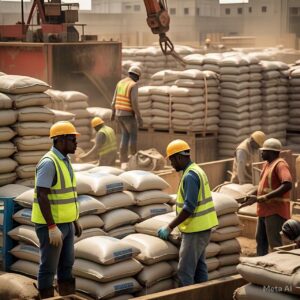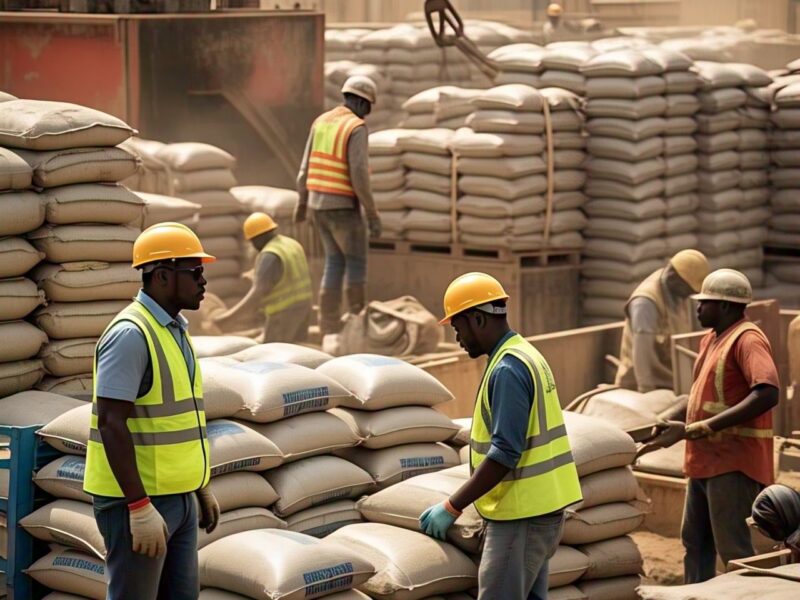Are you wondering how much a bag of cement costs in Nigeria? We’re here to break it down with fresh insights for March 2025. Cement prices fluctuate constantly, impacting construction costs nationwide. In this guide, we’ll explore:
- Current cement prices in Nigeria
- Top cement brands and their costs
- Wholesale vs. retail pricing
- Factors driving price changes
- Tips to save money on cement
From Lagos to Kano, we’ve got you covered. Let’s dive in!
Why Cement Prices Matter
Cement is the backbone of Nigeria’s booming construction sector. Whether we’re building houses, roads, or commercial spaces, cement holds everything together.
Right now, the price of a 50kg bag of cement in Nigeria ranges from ₦9,000 to ₦10,500. But why is cement so expensive? Let’s find out.

Current Cost of Cement in Nigeria (March 2025)
As of March 14, 2025, the average price of a 50kg bag of cement in major cities is:
- Lagos – ₦9,800
- Abuja – ₦10,000
- Port Harcourt – ₦9,700
- Kano – ₦10,200
- Enugu – ₦9,700
Cement prices fluctuate daily, driven by demand, location, and supply chain issues. Want the cheapest cement near you? Check local dealers for real-time updates.
Leading Cement Brands and Their Prices
Different brands, different prices. Here’s what we’re looking at:
- Dangote Cement – ₦9,500 – ₦10,000
- BUA Cement – ₦9,000 – ₦9,800
- Lafarge Cement – ₦10,000 – ₦11,500
- Ibeto Cement – ₦8,500 – ₦9,500
💡 Our pick depends on budget—what’s the best deal for you?
You can also read Current Price of BUA Cement in Nigeria
Wholesale vs. Retail Cement Prices
Buying in bulk saves money! Here’s how the numbers stack up:
- Retail Price: ₦9,000+ per bag
- Wholesale Price (600 bags): ₦7,500 – ₦9,000 per bag
- Total Cost for 600 Bags: ₦4.5 million – ₦5.4 million
💡 If you’re buying for a big project, wholesale pricing is a game-changer!
What’s Driving Cement Prices in Nigeria?
Why are cement prices skyrocketing? Here’s what’s pushing costs up:
- Weak Naira – Import costs surge as the naira struggles.
- High Fuel Prices – Diesel at ₦1,200 per liter raises production and transport costs.
- Skyrocketing Demand – More buildings, higher cement prices.
- Transportation Costs – Moving cement from Ogun to Kano isn’t cheap!
🚧 Feeling the pressure? We all are.
Government Intervention: Is It Helping?
In 2025, the government set a price cap of ₦7,000 to ₦8,000 per bag. But in reality, retail prices remain above ₦9,000 due to middlemen and market forces.
💬 Will these price controls work? We’re watching closely!
You can also read How Much Is Dangote Cement in Nigeria?
Cement Prices by Region
Where we buy cement affects the price:
- Lagos – ₦9,800
- Abuja – ₦10,000
- Kano – ₦10,200
- Enugu – ₦9,700
💡 Remote areas pay an extra ₦500 to ₦1,000 per bag.
Hidden Costs You Should Watch Out For
The bag price isn’t the full cost. Here’s what else we should consider:
- Delivery Fees – ₦50,000 per truckload (higher for longer distances).
- Storage Costs – Cement must be stored in a dry, secure space.
- Middlemen Fees – Dealers add ₦200 to ₦500 per bag.
How to Find the Cheapest Cement in Nigeria
Want the best deals? Here’s how we save money:
- Negotiate Prices – Dealers expect it, so let’s haggle!
- Buy in Bulk – Wholesale saves ₦1,000+ per bag.
- Check Jiji.ng – Some sellers offer ₦8,500 deals.
- Shop During Rainy Season – Demand dips, prices drop.
You can also read How Much is Pop Cement in Nigeria?
Alternatives to Traditional Cement
Cement is king, but other options exist:
- Fly Ash Cement – ₦7,000 per bag, eco-friendly.
- Local Bricks – ₦5,000 per load, cheaper and durable.
- Clay Blocks – A low-cost option for rural areas.
💡 Could we explore these alternatives?
Future Cement Price Trends in Nigeria (2025)
What’s ahead? Experts predict:
- Stronger Naira → Cement may drop to ₦8,000.
- Fuel Price Increase → Costs could hit ₦11,000+.
- Dangote Expansion → More supply, possibly lower prices.
💡 Cement prices remain a rollercoaster—what’s our next move?
Conclusion: Making Smart Cement Purchases
So, how much is a bag of cement in Nigeria today? We’re looking at ₦9,000 to ₦10,500, influenced by:
- Brand & quality
- Wholesale vs. retail pricing
- Regional costs
- Market trends
Armed with this knowledge, we buy smarter and build better. What’s our next step?
FAQs (Frequently Asked Questions)
What’s the cheapest cement in Nigeria?
Ibeto Cement sells for as low as ₦8,500, making it a budget-friendly choice.
How much is Dangote Cement in Nigeria?
Prices range between ₦9,500 to ₦10,000, depending on location.
Why do cement prices vary by region?
Transportation costs add ₦500 to ₦1,000 per bag in remote areas.
Can buying wholesale save us money?
Absolutely! Wholesale prices drop to ₦7,500 per bag for large orders.
Will cement prices in Nigeria decrease in 2025?
It depends—if the naira strengthens, prices could drop to ₦8,000.
✅ Now that we know the prices, where are we buying from? 💬
